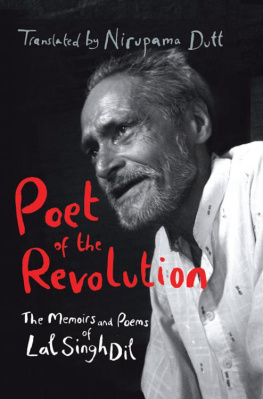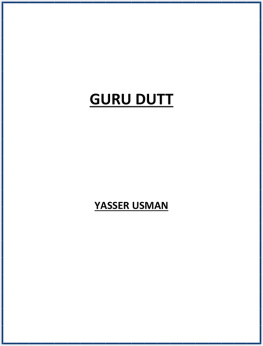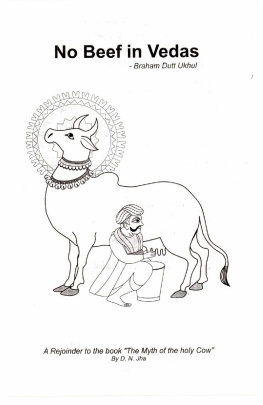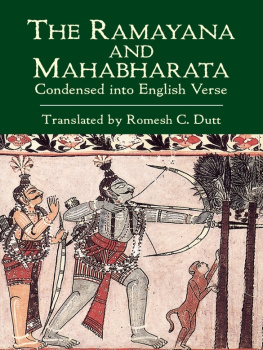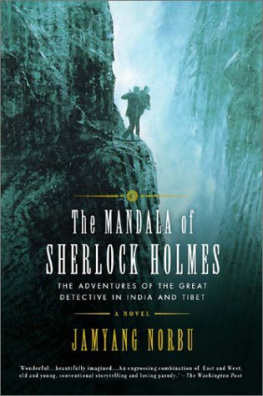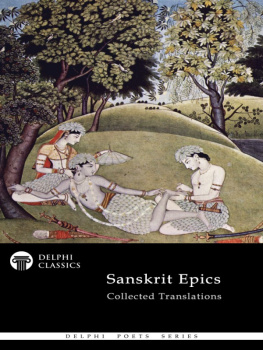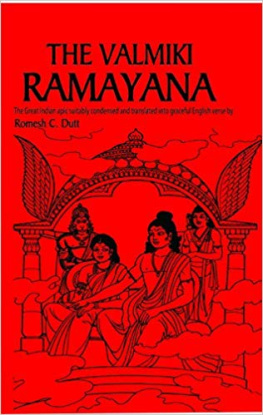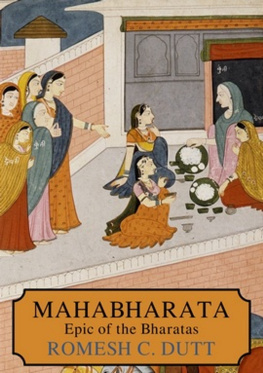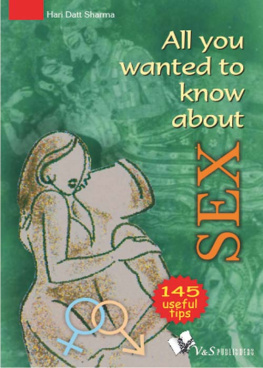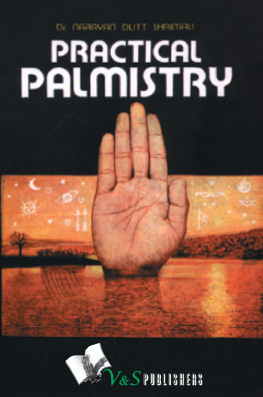Trbner's Oriental Series
LAYS OF ANCIENT INDIA
Trbner's Oriental Series
INDIA: LANGUAGE AND LITERATURE
In 14 Volumes
I Indian Poetry
Edwin Arnold
II A Sketch of the Modern Languages of the East Indies
Robert N Cust
III Lays of Ancient India
Romesh Chunder Dutt
IV The Birth of the War-God
Ralph T H Griffith
V The Bengali Drama
P Guha-Thakurta
VI Miscellaneous Essays Relating to Indian Subjects Vol I
Brian Houghton Hodgson
VII Miscellaneous Essays Relating to Indian Subjects Vol II
Brian Houghton Hodgson
VIII Metrical Translations from Sanskrit Writers
J Muir
IX The Spirit of Oriental Poetry
Puran Singh
X The History of Indian Literature
Albrecht Weber
XI The atakas of Bhartihari
B Hale Wortham
XII Behar Proverbs
John Christian
XIII A Classified Collection of Tamil Proverbs
Herman Jensen
XIV Folk-Tales of Kashmir
J Hinton Knowles
LAYS OF ANCIENT INDIA
SELECTIONS FROM INDIAN
POETRY RENDERED INTO
ENGLISH VERSE
ROMESH CHUNDER DUTT
First published in 1894 by
Routledge, Trench, Trbner & Co Ltd
Reprinted in 2000 by
Routledge
2 Park Square, Milton Park, Abingdon, Oxon, OX14 4RN
Transferred to Digital Printing 2007
Routledge is an imprint of the Taylor & Francis Group
1894 Romesh Chunder Dutt
All rights reserved. No part of this book may be reprinted or reproduced or utilized in any form or by any electronic, mechanical, or other means, now known or hereafter invented, including photocopying and recording, or in any information storage or retrieval system, without permission in writing from the publishers.
The publishers have made every effort to contact authors/copyright holders of the works reprinted in Trbner's Oriental Series. This has not been possible in every case, however, and we would welcome correspondence from those individuals/companies we have been unable to trace.
These reprints are taken from original copies of each book. In many cases the condition of these originals is not perfect. The publisher has gone to great lengths to ensure the quality of these reprints, but wishes to point out that certain characteristics of the original copies will, of necessity, be apparent in reprints thereof.
British Library Cataloguing in Publication Data
A CIP catalogue record for this book
is available from the British Library
Lays of Ancient India
ISBN 0-415-24502-8
India: Language and Literature: 14 Volumes
ISBN 0-415-24289-4
Trbner's Oriental Series
ISBN 0-415-23188-4
LAY OF ANCIENT INDIA
SELECTIONS FROM
INDIAN POETRY RENDERED INTO
ENGLISH VERSE
BY
ROMESH CHUNDER DUTT, C.I.E.
BARRISTER-AT-LAW, AND OF THE INDIAN CIVIL SERVICE; MEMBER OF
THE ROYAL ASIATIC SOCIETY AND OF THE ASIATIC
SOCIETY OF BENGAL
AUTHOR OF A HISTORY OF CIVILISATION IN ANCIENT INDIA, ETC.
LONDON:
ROUTLEDGE, TRENCH, TRBNER, & CO. L TD
PATERNOSTER HOUSE, CHARING CROSS ROAD
1894
TO MY LOVING DAUGHTERS
AMALA AND SARALA
I
Dedicate this Volume
WITH
A FATHER' BLESSING AND LOVE.
PREFACE
INDIAN poetry has been made known to English readers by distinguished English writers. A hundred years ago Sir William Jones translated the beautiful play of Sakuntal into English, and for the first time drew the attention of European readers to the beauty of Indian thought and poetry. H. H. Wilson followed in his footsteps, and rendered into graceful English verse some others of the best dramatic works in the Sanscrit language, and also a beautiful poem called Meghadta. Wilson's English translation of the Eig Veda has since been completed and published; and Mr. Griffiths has brought out a commendable metrical translation of the great epic Rrnyana. Max Mller has translated the ancient Upanishads and the Buddhist work Dhammapada into English prose: and the genius of Sir Edwin Arnold has made thousands of readers in Europe and in America familiar with the wealth of Indian thought and imagery, and the beauty of Buddhist precepts and doctrines.
The time has come for placing before English readers a carefully prepared book of selections from the entire range of ancient Indian poetry. Such a book of selections should convey something not only of the beauty of Indian poetry in general, but also of the distinctive features of the poetry of each special period,something of the freshness and simplicity of the Yedic Hymns, the sublime and lofty thought of the Upanishads, the unsurpassed beauty of Buddhist precepts, and the incomparable richness and imagery of the later or classical Sanscrit poetry. And it seems to me that such a book, comprising specimens from the literature of successive periods, is likely to give the English reader a general bird's-eye view of Indian poetry, Indian thought, and Indian religion.
I cannot help feeling my own unfitness for undertaking such a task in a language which is not my mother tongue. But nevertheless the reception which has been accorded to my work on Civilisation in Ancient India emboldens me to make the attempt; and I believe that the readers of my previous work, who have studied the history of ancient India through its successive periods, will feel some interest in the lays of Ancient India, illustrating the life and thought of those periods.
The literature of ancient India, like its history, divides itself into five successive periods. The Vedic period is believed to cover five or six centuries, from 2000 to 1400 B.C.; and of the thousand hymns of the Rig Yeda which have been left to us I have translated fourteen in the present volume. The freshness and joyousness of the Vedic Hymns characterise them as a true and faithful picture of the times in which they were composed.
The second or epic period is believed to cover four or five hundred years, from 1400 to about 1000 B.C. The great epics of India, the Mahbhrata and the Rmyana, were, in their original shape, composed in this period, and describe the deeds and wars of nations who lived in the Gangitic valley in this age. The Bmyana has been rendered into English verse by Mr. Griffiths, and portions of the Mahbhrata have been translated by eminent Englishmen, from Dean Milman to Sir Edwin Arnold. I have not attempted to do once more what these eminent writers have done. I have confined my selections of this period to those remarkable compositions, the Upanishads, which are among the most valuable works in the literature of the world. They show us how the Nature-worship of the Kig Yeda developed itself into the worship of Nature's God,the Universal Soul from whom the whole universe has emanated, and into whom the whole universe will resolve itself. This is the essence of the Hindu religion and of Hindu thought, and we find this thought in its purest and best form in the Upanishads. They are in prose, but breathe the sublimest poetry, and I have ventured to translate eight passages from these venerable works into English verse.
The third period is one of seven centuries, from 1000 B.C. to the time of Alexander the Great and Chandragupta of Magadha, about 320 B.C. Philosophy and science and grammar were cultivated with remarkable success in India in this period; and the ancient sacrificial rules and social and domestic rules were also compiled in compact works. And it was in this period that Gautama Buddha was born and preached that noble religion which is now the faith of a third of the human race. The Buddhist Scriptures belong to this age, and have been faithfully preserved in the Pali language in Ceylon. The life and teachings of the Light of Asia have been told in English verse as only a true poet cm tell them, and there is no room for a mere translator to go over the same ground. I have therefore only given two passages from the Buddhist Scriptures, and a few maxims from the Dhammapada.




